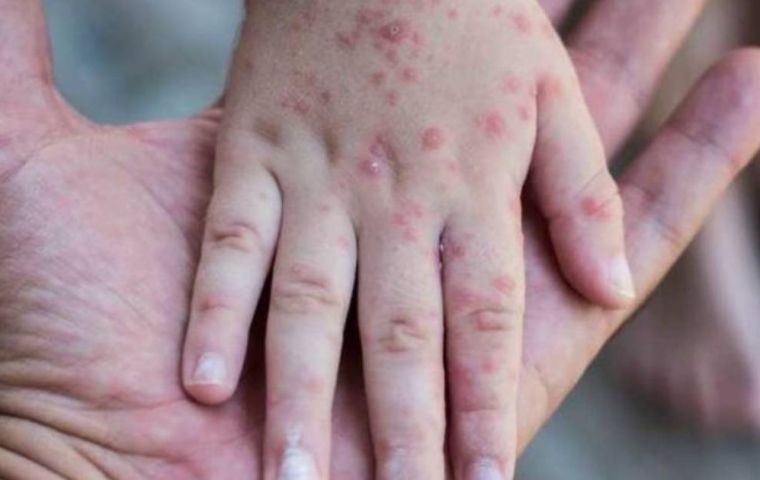MercoPress. South Atlantic News Agency
Colombia confirms first 3 cases of monkeypox
 Even if WHO announces monkeypox is a global emergency, it is still unclear what impact that might have
Even if WHO announces monkeypox is a global emergency, it is still unclear what impact that might have Colombian health authorities Thursday confirmed the first three local cases of monkeypox had been detected. Two of the patients were also proved to have had a recent travel history to Europe.
Also Thursday, Argentina confirmed a fourth case of the malady on the same day the World Health Organization's emergency committee convened to determine whether to declare monkeypox a pandemic or not.
Two of the Colombian cases were in Bogotá and the other in Medellín, it was also reported. “They were identified in Bogota with a history of travel to Europe and, after taking serum samples, exudate of lesions and pharyngeal swab, they are in isolation with contact tracing,” according to a statement from the Ministry of Health.
Epidemiology and Demography Director Claudia Cuéllar called all Colombians not to panic, but to rather be alert at the possible appearance of symptoms or a suspicion of having been in close contact with a confirmed patient. In either case, ”call your EPS (Health Care Provider Entity) or go to the nearest health center,” she said.
Argentine authorities confirmed Thursday a new case of monkeypox in the country, reported (west), which adds four contagions so far.
The Argentine patient is a 45-year-old man living in the province of Mendoza who had traveled to Spain in the last 21 days and who had a fever above 38 degrees in addition to the inflammation of the lymph nodes and vesicular rashes on June 15. The case was first suspected of being monkeypox on June 19, and on June 21, samples were sent to a laboratory. “At the moment, his state of health is good and he is undergoing the corresponding isolation,” according to Argentine authorities.
The World Health Organization (WHO) has confirmed around 3,500 cases in 42 countries over the past six weeks, due to which an emergency committee has convened in Geneva to assess whether the outbreak of monkeypox constitutes a “public health emergency of international concern.” This is the highest level of alert the agency can declare, a consideration currently held by coronavirus and polio.
Such a declaration would seek to increase coordination among countries and strengthen mechanisms for the active search for cases and the implementation of measures worldwide to help curb the circulation of the virus, something that should take place in the coming weeks.
The results of the meeting are to be announced to the press Friday at noon, local time, or by Saturday morning, when a statement is also expected to be released.
The committee's meeting comes amid growing concern about the increase in cases in non-endemic areas outside Africa, especially Europe but also the Americas, with cases also in Asia and Oceania.
Spain has taken over as the country with the highest number of cases (over 800), followed by the UK (793), Germany (592), Portugal (317), France (277), Canada (245), the Netherlands (167) and the United States (156), according to figures released by WHO Thursday morning.
Several scientists have come out in favor of broadening the case definition, the criteria that a patient must meet in order to be tested to confirm or rule out that he or she is a carrier of the monkeypox virus.
A letter published in The Lancet this month warned that “the current case definition would not detect the disease in a heterosexual man with the characteristic vesicles of the rash if he has not traveled [to a risk area] or is a confirmed case report.”
“To the untrained eye, monkeypox can easily be confused with other diagnoses with dermatological conditions such as chickenpox, herpes zoster, herpes simplex, syphilis, gonorrhea, or molluscum contagiosum,” the letter went on.
Declaring monkeypox a global emergency would mean the UN health agency considers the outbreak to be an “extraordinary event” and that the disease might spread across even more borders. It would also give monkeypox the same distinction as the COVID-19 pandemic and the ongoing effort to eradicate polio.
Last week, WHO Director-General Tedros Adhanom Ghebreyesus described the appearance of monkeypox as “unusual and concerning.” Until last month, monkeypox had not caused sizeable outbreaks beyond Africa, where it has sickened people for decades. One of the variants of monkeypox kills up to 10% of people. Africa has already seen more than 1,400 cases this year, including 62 deaths.
The vast majority of cases outside Africa have been detected in men who have sex with men, but scientists warn anyone in close contact with an infected person or their clothing or bedsheets is at risk of infection.
Even if WHO announces monkeypox is a global emergency, it is still unclear what impact that might have. In January 2020, WHO declared COVID-19 an international emergency, but few countries took notice until March, when the organization described it as a pandemic.
According to health experts, the rash generated by monkeypox “usually begins one to three days after the onset of fever. The lesions may be flat or slightly raised, filled with clear or yellowish liquid, and then they may crust over, dry up and fall off.
Symptoms also include headache, muscle or back pain, swollen glands, and fatigue, as well as ”skin rash, which goes through different stages until it forms a crust that then falls off.
Infected persons are contagious until all the scabs have fallen off,” according to WHO.




Top Comments
Disclaimer & comment rulesCommenting for this story is now closed.
If you have a Facebook account, become a fan and comment on our Facebook Page!